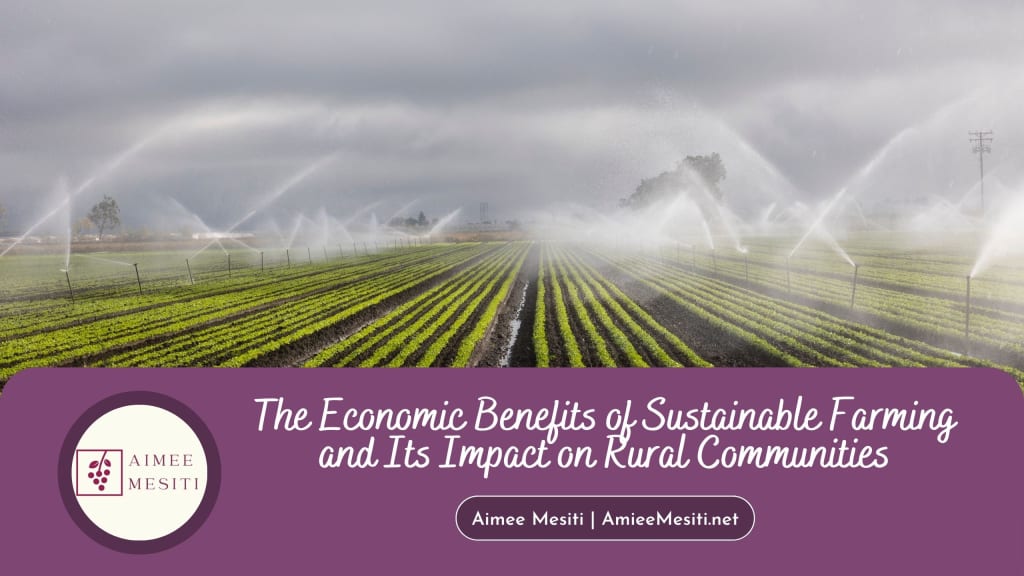Aimee Mesiti discusses The Economic Benefits of Sustainable Farming and Its Impact on Rural Communities | Brockport, New York
Aimee Mesiti | Lifestyle

Sustainable farming practices have gained significant attention in recent years due to their positive environmental impact. However, the economic benefits of sustainable farming extend beyond ecological considerations. Let's look at how sustainable farming practices contribute to rural communities' economic growth and vitality. From increased job opportunities to enhanced market access and improved community well-being, sustainable farming is a win-win approach for both the environment and rural economies.
Diversification of Income Sources
Traditional agriculture often relies on a single crop or livestock, leaving farmers vulnerable to market fluctuations and weather-related risks. Sustainable farming, on the other hand, promotes diversification by incorporating various crops, livestock, and agroforestry practices. Farmers can mitigate risks and generate multiple income streams by diversifying their production. For instance, incorporating beekeeping, organic vegetable farming, or agritourism activities can provide additional revenue sources, contributing to rural communities' economic stability.
Job Creation and Local Employment
Sustainable farming practices require a more labor-intensive approach compared to conventional methods. As a result, they create additional employment opportunities within rural communities. The need for skilled labor in organic farming, soil conservation, and agroecological practices opens doors for residents to acquire new skills and secure employment. This not only reduces unemployment rates but also helps revitalize rural areas by retaining and attracting a younger workforce.
Market Access and Premium Pricing
Consumers today are increasingly conscious of their purchasing decisions' environmental and social impact. Sustainable farming practices align with these values, allowing farmers to tap into growing markets for organic and sustainably produced food. By adopting organic certifications and sustainable farming techniques, farmers gain access to premium markets and can command higher prices for their products. This not only boosts individual farmers' income but also benefits the overall rural economy by retaining more value within the community.
Reduction in Input Costs
Conventional farming often relies heavily on synthetic fertilizers, pesticides, and machinery, which can be costly for farmers. Sustainable farming practices emphasize natural soil fertility, crop rotation, and integrated pest management techniques, leading to reduced reliance on expensive inputs. By minimizing input costs, sustainable farming enables farmers to improve their profit margins and reinvest in their operations. In turn, this contributes to rural communities' economic resilience and long-term sustainability.
Community Well-being and Local Food Security
Sustainable farming practices foster a closer connection between farmers and consumers, promoting local food systems and enhancing community well-being. Farmers' markets, community-supported agriculture (CSA) programs, and farm-to-table initiatives have become integral parts of rural communities. These local food networks provide fresh and nutritious produce, strengthen social ties, and promote a sense of community pride. Moreover, by reducing dependence on distant food sources, sustainable farming enhances local food security and resilience in the face of global disruptions.
Sustainable farming practices offer far-reaching economic benefits that extend beyond environmental considerations. As we strive for a more sustainable future, it is crucial to recognize and support the economic advantages that sustainable farming brings to rural areas, ensuring the prosperity of both people and the planet.
This blog was previously published on July 21, 2023 at AimeeMesiti.net
About
Based in Brockport, New York, Aimee Mesiti pursues a healthy and active lifestyle while investing in a career she is proud of. After spending 25 years working as a Physical Therapy Assistant while raising five boys, Aimee chose to retire and pursue her dream: her own winery. In 2016, Five Sons Winery, Inc. officially opened. Since then, under Aimee’s leadership, the company has expanded to become an event venue that also boasts a brewery and a full-service farm-to-table restaurant. Located in Brockport, New York, Aimee loves serving her community through the winery and giving back whenever possible.
Aimee Mesiti is passionate about health and wellness, which is evident in her choices in Five Sons Winery’s operations. She is constantly striving to be the best version of herself, mentally and physically, and has seen how that has guided her success within her family and her professional sphere. Aimee pursues these goals in a variety of ways. For one, she stays active and enjoys exercising. She loves working out on her Peloton bike and also enjoys going kayaking or hiking when the weather is nice.
Additionally, Aimee Mesiti strives to make healthy food choices and loves the satisfaction of growing her own food for her family. With this in mind, when she chose to add the full-service restaurant at the winery, she knew she wanted to prioritize farm-to-table options, offering patrons healthy and delicious options while supporting local farmers. In fact, she has recently begun growing produce specifically for the restaurant, allowing them to offer fresh ingredients grown on-site.
About the Creator
Aimee Mesiti
Aimee Mesiti is a successful entrepreneur based in Brockport, New York. She founded Five Sons Winery in 2016, in honor of her five boys who have grown into hard-working adults.






Comments
There are no comments for this story
Be the first to respond and start the conversation.